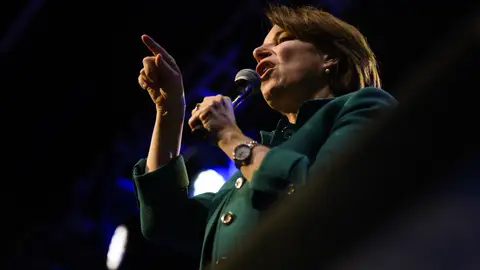Did the NYT Really Just Endorse a Candidate With No LGBTQ Platform?

By Jeff Taylor and Kate Sosin
If The New York Times’ Democratic primary endorsement were a meme, it would be the little girl asking, “Why not both?”
The Times' editorial board decided to have it both ways and opted to back the two women left in the race: Sens. Elizabeth Warren and Amy Klobuchar, candidates who represent opposite ends of the Democratic political spectrum.
For LGBTQ Americans, this clickbait-y double endorsement not only presents a confusing choice, but an actual problem. Just two Democractic frontrunners have failed to offer LGBTQ policy platforms this election season: former Vice President Joe Biden and Amy Klobuchar. NewNowNext has repeatedly invited Klobuchar and Biden to go on-record on LGBTQ rights. Only Biden has.
Klobuchar has never been held up as champion of LGBTQ equality, evolving on queer rights largely when politically expedient. She opposed marriage equality as late as 2009, and while her views were shifting by 2011, she was still considered a holdout for repealing the Defense of Marriage Act that year. While she did ultimately back the repeal, she did not sign onto the Democractic Party’s Freedom to Marry plank in 2012.
Klobuchar’s vote in 2018 to confirm anti-LGBTQ Trump appointee David Ryan Stras to the U.S. Eighth Circuit Court of Appeals has also raised concerns among advocates. She was among just seven Democrats to vote in favor of his confirmation in a vote that otherwise fell along party lines.
As a law professor in 2008, Stras criticized judges’ “ventures” into social issues like LGBTQ rights, abortion, and school integration. In 2012, as a Minnesota Supreme Court justice, he joined an opinion allowing an anti-marriage equality amendment to appear on the ballot: Minnesota Amendment 1. The amendment, which ultimately failed to pass, was criticized for bearing a title that some said obscured its purpose.
Klobuchar campaign spokesperson Carlie Waibel told the Washington Blade that the senator’s vote was not an endorsement of all Stras' prior statements, and was in part due to fears Trump could select an even worse option if Stras failed to make it through the confirmation process.
Klobuchar has also faced criticism for requesting a $500,000 earmark in 2008 for Minnesota Teen Challenge. The organization’s application at the time listed “homosexuality” as a problem applicants might be facing.
Klobuchar’s troubled history on LGBTQ rights makes it that much more pressing that she release an LGBTQ policy platform, thereby demonstrating an understanding of and commitment to queer rights. At the CNN LGBTQ Town Hall last October, Klobuchar told reporters she was against decriminalizing sex work, something many LGBTQ advocates have been pushing as a solution to stem the tide of violence against transgender women of color.
“A lot of people that work in that industry are victims,” Klobuchar told reporters. “Not all of them are, but I do feel strongly that I don’t want to decriminalize it.”
By contrast, Warren and Pete Buttigieg have released extensive policy proposals. Sen. Bernie Sanders’ LGBTQ platform, while shorter, offers a detailed look at what he would do to advance queer rights if elected.
Biden and Klobuchar have offered nothing to voters, but LGBTQ people are likely to feel more comfortable casting a ballot for Biden, whose record on LGBTQ rights in the Obama administration is difficult to dispute versus Klobuchar.
The Times praised Klobuchar as “a standard-bearer for the Democratic center,” whom “given the polarization in Washington and beyond” the board believes would have “the best chance to enact many progressive plans.”
It’s the old “maybe Republicans will be willing to compromise with a centrist” ruse that should have been cast aside by any and all observers of the Obama years, when the GOP’s sole objective was to act as a roadblock for even the most moderate of initiatives. With Senate Leader Mitch McConnell operating a veritable "legislative graveyard," there is no reason to believe that situation has changed. If anything, it has only gotten worse.
Voters won’t have the luxury of playing it both ways when it comes time to have their say, and neither should The Times’ editorial board. A dual endorsement will surely satisfy traffic goals for the The Times. But at a time when the Trump administration has threatened to legally erase transgender Americans, and debated the rights of LGBTQ Americans to hold jobs in the nation's highest court, an endorsement for a presidential candidate without an LGBTQ plan should satisfy no one.





